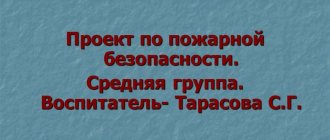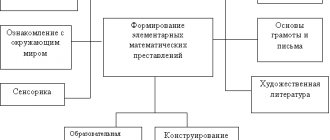Methodological work based on diagnostics
To optimize the management of preschool educational institutions, it is necessary to increase the efficiency of methodological work with teachers. When this type of work is based on diagnostics, it becomes possible to optimize the pedagogical process, since such a basis involves a detailed study of the needs of both children and parents, the capabilities of each teacher and the entire team, and this makes it possible to determine the most effective set of forms, techniques and methods of methodological work, which improve pedagogical skills, professional qualifications, and stimulate the creativity of teachers.
A low level of quality of education may have several reasons: shortcomings in the training of educators, lack of interaction with parents, an outdated education program, methods and technologies for working with children, or an unsystematic set of innovations, etc. Main direction
methodological work is to identify these reasons, provide consultations and specific recommendations to educators, and develop a plan for the implementation of improving the quality of educational services of preschool educational institutions.
When studying the pedagogical activity of a teacher, it is necessary to evaluate his ability to organize and conduct various types of children’s activities (work, play, art and theater), the ability to develop speech, qualities and skills for communicating with preschoolers.
Advanced training
educators are provided with information about scientific and theoretical knowledge. The educator must understand that the teacher’s diagnosis is a theoretical foundation for the implementation of practical activities. Diagnosis of the development of preschoolers should be subject to correction by the methodologist, and the teacher should have an idea of \u200b\u200bthe diagnosis of the pedagogical process. The creativity and freedom of educators should be both encouraged and corrected.
Modern educators must master methods of psychological and pedagogical diagnostics of development, studying the pedagogical culture of parents, self-diagnosis of their professional and psychological activities; skills to assess the conditions in which preschoolers live.
Monitoring in a preschool educational institution
Monitoring is a derived form of the Latin monitor, meaning the implementation of an action that is aimed at implementing functions such as observation, control and warning. Pedagogical monitoring
call the form of organization, collection, processing, storage and dissemination of data on the activities of the pedagogical system. This form provides monitoring of the state of the pedagogical system and allows us to predict its development.
Monitoring results are monitored at three levels: teacher, leader and parents, they are also its objects. Its type, tasks and goals depend on who is selected as the monitoring object. The parameters and characteristics of activity processes are the most informative and efficient and are monitored primarily. Then they observe, evaluate and predict changes in the state of the object.
Monitoring is a different concept from diagnostics, since during diagnostics the activity is aimed at studying an already known phenomenon, which is sufficiently described and allows the diagnostician to compare data about it with the information received. The distinctive features of monitoring include the following:
- The tracking system lasts 1, 3, 5 years;
- This is a special purposeful system; it is systematic and conscious at every stage of the pedagogical process.
During monitoring, all attention is directed to the characteristics of the pedagogical process, to what features it occurs. This information is more immediate and important than effective. Monitoring studies have made it possible to identify a number of tasks that determine its essence
:
- the state of the educational system is continuously monitored, as far as competence allows, and prompt information about it can be obtained;
- it is possible to timely identify changes in the education system, as well as the factors that caused them;
- negative trends in the education system can be prevented;
- the development of the most important processes in the educational system can be predicted in the short term;
- completeness of implementation and assessment of the effectiveness of methodological support for education.
Considering the fact that monitoring involves continuous observation of the educational process, several organizational and methodological requirements
:
- The form and set of monitoring indicators must be constant and organic over a given period of time;
- Indicators, if possible, should capture the phenomena of the education process that have already been deeply studied and can adequately reflect the level of quality of education;
- Indicators for managing the quality of education should be of an evaluative nature;
- At least once a year, the set of indicators used must be adjusted.
It turns out that monitoring is a holistic system that implements many functions.
Aspects
monitoring, according to N.P. Tropnikova are the following:
- continuity (data is collected continuously);
- diagnosticity (there are criteria or models with which the current state of an object, process or system is compared);
- scientific nature (monitored parameters and models are justified);
- feedback (the monitored object is informed of the results, so it is possible to make adjustments to the monitored process).
Receiving the information.
In the education system, dissemination of information is of particular importance for monitoring. At the same time, the importance of various tools for influencing decision-making, which include informing society and forming public opinion, is not denied, but is not called the main one for monitoring. When monitoring, the opinion of the educational institution and the education system is also taken into account; it is expressed by managers.
The stage of obtaining research data borders on its analysis, and between them there is a stage of discussion
with the administration of monitoring results. This “middle” stage needs to be fulfilled, since there is a requirement for the consideration of the received information in the future and its use in practice. Discussion cannot be called a scientific way of obtaining information, but it is very valuable for monitoring.
When monitoring in education, there should be some kind of information dissemination system that is complex but reliable. This is due to two groups of monitoring
:
- collecting information, recording current data;
- taking into account the information received, making management decisions, regulating the pedagogical process.
Considering the above, we can highlight the relevance of using monitoring in an educational institution, these are:
- Determining the effectiveness and success of how the educational process proceeds;
- Teachers are trained in self-assessment and self-analysis of their activities in the educational process;
- The quality of the educational process is managed expediently;
- Prospects for the development of objects/subjects of the educational process are predicted.
Monitoring the quality of education in preschool educational institutions.
The definition of pedagogical monitoring should be considered from the quality of education
, it is a characteristic of education - a set of properties that help meet the needs of education and meet the interests of society. Monitoring the quality of education in a preschool institution aims to form a holistic picture of the quality of the entire education system. At the same time, the quality of education is considered in the form of a generalized measure of the effectiveness of the education system in preschool educational institutions; it is manifested in the ability to provide a range of services that would meet the needs and expectations of consumers and the requirements of regulatory documents (laws).
When analyzing the information base for monitoring the quality of education, its specific features were identified, which occur at the stages of collecting and assessing information. They do not study all the available information, but only that which will help create a complete picture of the quality of education provided by the preschool institution.
In stages
collection of information are:
- Identify the hidden reserves and potential capabilities of each teacher and the entire team;
- Identify the conditions under which the selected technologies and programs are implemented;
- Determine the abilities, interests, level of development of children, teachers, and staff;
- Provide assistance to teachers in mastering research activities;
- To promote the creative development of personality, to help teachers master self-diagnosis of their professional activities.
The effectiveness of education is determined by performing the following algorithm
:
- determine the goals and objectives of training;
- appropriate criteria for determining the result;
- choose a teaching method;
- prepare diagnostic tools;
- examine subjects;
- process the results of the study and interpret them;
- analyze, evaluate the results and discuss them.
In pedagogical science, diagnosing the effectiveness of educational institutions is considered a fairly new area, but many diagnostic techniques already exist.
Monitoring system.
Monitoring the quality of education in preschool educational institutions is carried out using a system consisting of 4 blocks:
- Quality of the educational process;
- Quality of resource provision;
- Quality of management;
- Quality of work results.
These blocks, together with the many elements that make up them, are carriers of the quality of education. In its structure, integral properties are distinguished that characterize quality in the form of the integrity of its simple and composite elements. These include: consistency, adaptability, focus on personality and activity, focus on humanities and cultural studies, reliability, continuity, efficiency, optimality, functionality. In addition, the structure
The quality of education includes the quality of the didactic orientation of children’s activities (construction, games), the quality of forms of organization of life activities (entertainment, activities), and the quality of independent activity.
To study and evaluate the quality of education, a group of indicators is used; they are limited in quantity, but their totality makes it possible to fully study the object of monitoring. The indicator is considered as a characteristic of a certain aspect of a quality property.
Methodological work based on diagnostics.
To optimize the management of preschool educational institutions, it is necessary to increase the efficiency of methodological work with teachers. When this type of work is based on diagnostics, it becomes possible to optimize the pedagogical process, since such a basis involves a detailed study of the needs of both children and parents, the capabilities of each teacher and the entire team, and this makes it possible to determine the most effective set of forms, techniques and methods of methodological work, which improve pedagogical skills, professional qualifications, and stimulate the creativity of teachers.
A low level of quality of education may have several reasons: shortcomings in the training of educators, lack of interaction with parents, an outdated education program, methods and technologies for working with children, or an unsystematic set of innovations, etc. Main direction
methodological work is to identify these reasons, provide consultations and specific recommendations to educators, and develop a plan for the implementation of improving the quality of educational services of preschool educational institutions.
When studying the pedagogical activity of a teacher, it is necessary to evaluate his ability to organize and conduct various types of children’s activities (work, play, art and theater), the ability to develop speech, qualities and skills for communicating with preschoolers.
Advanced training
educators are provided with information about scientific and theoretical knowledge. The educator must understand that the teacher’s diagnosis is a theoretical foundation for the implementation of practical activities. Diagnosis of the development of preschoolers should be subject to correction by the methodologist, and the teacher should have an idea of \u200b\u200bthe diagnosis of the pedagogical process. The creativity and freedom of educators should be both encouraged and corrected.
Modern educators must master methods of psychological and pedagogical diagnostics of development, studying the pedagogical culture of parents, self-diagnosis of their professional and psychological activities; skills to assess the conditions in which preschoolers live.






